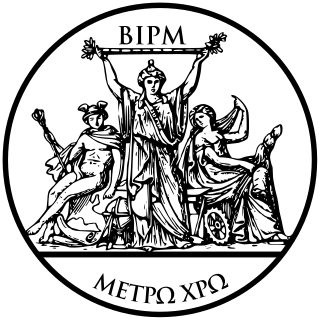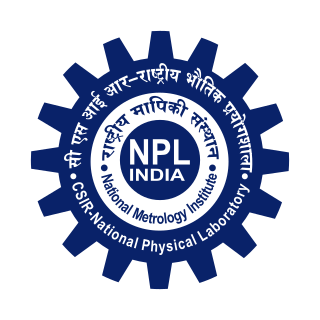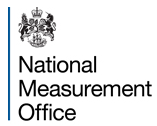Related Research Articles

The International Bureau of Weights and Measures is an intergovernmental organisation, through which its 64 member-states act on measurement standards in areas including chemistry, ionising radiation, physical metrology, as well as the International System of Units (SI) and Coordinated Universal Time (UTC). It is based in Saint-Cloud, near Paris, France. The organisation has been referred to as IBWM in older literature.

The imperial system of units, imperial system or imperial units is the system of units first defined in the British Weights and Measures Act 1824 and continued to be developed through a series of Weights and Measures Acts and amendments.

Metrology is the scientific study of measurement. It establishes a common understanding of units, crucial in linking human activities. Modern metrology has its roots in the French Revolution's political motivation to standardise units in France when a length standard taken from a natural source was proposed. This led to the creation of the decimal-based metric system in 1795, establishing a set of standards for other types of measurements. Several other countries adopted the metric system between 1795 and 1875; to ensure conformity between the countries, the Bureau International des Poids et Mesures (BIPM) was established by the Metre Convention. This has evolved into the International System of Units (SI) as a result of a resolution at the 11th General Conference on Weights and Measures (CGPM) in 1960.

The Indian Police Service is a civil service under the All India Services. It replaced the Indian Imperial Police in 1948, a year after India became independent from the British Empire.

The Government of India is the government of the Republic of India, located in South Asia, consisting of 36 states and union territories. The government is led by the prime minister who exercises the most executive power and selects all the other ministers. The country has been governed by a NDA-led government since 2014. The prime minister and their senior ministers belong to the Union Council of Ministers—its executive decision-making committee being the cabinet.

Law enforcement in India is imperative to keep justice and order in the nation. Indian law is enforced by a number of agencies. India has a multi-layered law enforcement structure with both federal and state/union territory level agencies, including specialized ones with specific jurisdictions. Unlike many federal nations, the constitution of India delegates the maintenance of law and order primarily to the states and territories.

The legal system of India consists of civil law, common law, customary law, religious law and corporate law within the legal framework inherited from the colonial era and various legislation first introduced by the British are still in effect in modified forms today. Since the drafting of the Indian Constitution, Indian laws also adhere to the United Nations guidelines on human rights law and the environmental law. Personal law is fairly complex, with each religion adhering to its own specific laws. In most states, registering of marriages and divorces is not compulsory. Separate laws govern Hindus including Sikhs, Jains and Buddhist, Muslims, Christians, and followers of other religions. The exception to this rule is in the state of Goa, where a uniform civil code is in place, in which all religions have a common law regarding marriages, divorces, and adoption. On February 7, 2024, the Indian state of Uttarakhand also incorporated a uniform civil code. In the first major reformist judgment for the 2010s, the Supreme Court of India banned the Islamic practice of "Triple Talaq". The landmark Supreme Court of India judgment was welcomed by women's rights activists across India.
Trading Standards are the local authority departments with the United Kingdom, formerly known as Weights and Measures, that enforce consumer protection legislation.

The CSIR- National Physical Laboratory of India, situated in New Delhi, is the measurement standards laboratory of India. It maintains standards of SI units in India and calibrates the national standards of weights and measures.

The National Measurement and Regulation Office (NMRO) was an executive agency of the UK Government's Department for Business, Innovation and Skills (BIS). Its function were to provide a measurement infrastructure which supports innovation, facilitates fair competition, promotes international trade and protects consumers and the environment.

The Ministry of Consumer Affairs, Food and Public Distribution is a government ministry of India. The ministry is headed by a Cabinet rank minister.
Consumer protection is the practice of safeguarding buyers of goods and services, and the public, against unfair practices in the marketplace. Consumer protection measures are often established by law. Such laws are intended to prevent businesses from engaging in fraud or specified unfair practices to gain an advantage over competitors or to mislead consumers. They may also provide additional protection for the general public which may be impacted by a product even when they are not the direct purchaser or consumer of that product. For example, government regulations may require businesses to disclose detailed information about their products—particularly in areas where public health or safety is an issue, such as with food or automobiles.

The Bureau of Indian Standards (BIS) is the National Standards Body of India under Department of Consumer affairs, Ministry of Consumer Affairs, Food & Public Distribution, Government of India. It is established by the Bureau of Indian Standards Act, 2016 which came into effect on 12 October 2017. The Minister in charge of the Ministry or Department having administrative control of the BIS is the ex-officio President of the BIS. BIS has 500 plus scientific officers working as Certification Officers, Member secretaries of technical committees and lab OIC's.

The Narcotics Control Bureau is an Indian central law enforcement and intelligence agency under the Ministry of Home Affairs, Government of India. The agency is tasked with combating drug trafficking and the use of illegal substances under the provisions of Narcotic Drugs and Psychotropic Substances Act.

The Enforcement Directorate (ED) is a law enforcement and economic intelligence agency of the Government of India. Established on 1 May 1956, it is responsible for enforcing economic laws and combating financial crimes. The ED operates under the Department of Revenue, Ministry of Finance, with its headquarters in New Delhi.

Piyush Vedprakash Goyal is an Indian politician and chartered accountant who is serving as Minister of Commerce and Industry since 2019. He also served as Minister of Textiles and Minister of Consumer Affairs, Food and Public Distribution. He was elevated to the Cabinet Minister position on 3 September 2017. Formerly a Member of Parliament for Rajya Sabha from the state of Maharashtra, he is also the former Leader of the House in Rajya Sabha. Goyal was elected as member of 18th Lok Sabha Representing Mumbai North Lok Sabha constituency.

The Food Safety and Standards Authority of India (FSSAI) is a statutory body under the administration of the Ministry of Health and Family Welfare, Government of India. It regulates the manufacture, storage, distribution, sale, and import of food articles, while also establishing standards to ensure food safety. The FSSAI was established by the Food Safety and Standards Act, 2006, which consolidated all former acts and orders related to food safety that were previously handled by various ministries and departments.
Pushpa Girimaji is an author, journalist, consumer rights columnist and consumer safety advocate. She is the only Indian journalist to have written a weekly consumer column continuously for over three decades.
The Standards of Weights and Measures Act, 1976 was an Act of the Parliament of India enacted to establish standards of weights and measures, and to regulate trade or commerce in weights, measures, and other goods sold or distributed by weight, measure, or number. The Act aimed to ensure uniformity and accuracy in weights and measures across India.
The Indian Institute of Legal Metrology (IILM) is a statutory body established by the Government of India under the provisions of the Standards of Weights and Measures Act, 1976, and is deemed to have been established under section 21 of the Legal Metrology Act, 2009. It is located in Ranchi, India, and operates under the direct control of the Ministry of Consumer Affairs, Food and Public Distribution, Department of Consumer Affairs.
References
- ↑ "Delhi: Now upload pics of products, bills via app for redressal of consumer grievances". Deccan Herald. Retrieved 2024-12-27.
- 1 2 "The Legal Metrology Act, 2009" (PDF). Government of India. Retrieved 2024-07-11.
- ↑ "Delhi Confidential: An unusual sight as Piyush Goyal inaugurates national workshop on Legal Metrology Act". The Indian Express. 2022-05-10. Retrieved 2024-12-27.
- ↑ "The Legal Metrology Act, 2009". Department of Consumer Affairs, Government of India. Retrieved 2024-07-11.